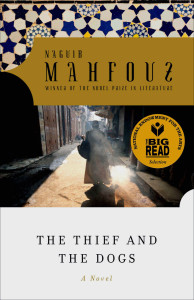 by Naguib Mahfouz
by Naguib Mahfouz
Egypt. 1961. 160 pages.
For the Berlin group
After four years in prison, the skilled young thief Said Mahran emerges bent on revenge. He finds a world that has changed in more ways than one. Egypt has undergone a revolution and, on a more personal level, his beloved wife and his trusted henchman, who conspired to betray him to the police, are now married to each other and are keeping his six-year-old daughter from him. But in the most bitter betrayal, his mentor, Rauf Ilwan, once a firebrand revolutionary who convinced Said that stealing from the rich in a unjust society is an act of justice, is now himself a rich man, a respected newspaper editor who wants nothing to do with the disgraced Said. As Said’s wild attempts to achieve his idea of justice badly misfire, he becomes a hunted man so driven by hatred that he can only recognize too late his last chance at redemption.
About the author
 Born in Cairo in 1911, Naguib Mahfouz began writing when he was seventeen. His first novel was published in 1939 and ten more were written before the Egyptian Revolution of July 1952, when he stopped writing for several years. One novel was republished in 1953, however, and the appearance of the Cairo Triology, Bayn al Qasrayn, Qasr al Shawq, Sukkariya (Between-the-Palaces, Palace of Longing, Sugarhouse) in 1957 made him famous throughout the Arab world as a depictor of traditional urban life. With The Children of Gebelawi (1959), he began writing again, in a new vein that frequently concealed political judgements under allegory and symbolism. Works of this second period include the novels, The Thief and the Dogs (1961), Autumn Quail (1962), Small Talk on the Nile (1966), and Miramar (1967), as well as several collections of short stories.
Born in Cairo in 1911, Naguib Mahfouz began writing when he was seventeen. His first novel was published in 1939 and ten more were written before the Egyptian Revolution of July 1952, when he stopped writing for several years. One novel was republished in 1953, however, and the appearance of the Cairo Triology, Bayn al Qasrayn, Qasr al Shawq, Sukkariya (Between-the-Palaces, Palace of Longing, Sugarhouse) in 1957 made him famous throughout the Arab world as a depictor of traditional urban life. With The Children of Gebelawi (1959), he began writing again, in a new vein that frequently concealed political judgements under allegory and symbolism. Works of this second period include the novels, The Thief and the Dogs (1961), Autumn Quail (1962), Small Talk on the Nile (1966), and Miramar (1967), as well as several collections of short stories.
Until 1972, Mahfouz was employed as a civil servant, first in the Ministry of Mortmain Endowments, then as Director of Censorship in the Bureau of Art, as Director of the Foundation for the Support of the Cinema, and, finally, as consultant on Cultural Affairs to the Ministry of Culture. The years since his retirement from the Egyptian bureaucracy have seen an outburst of further creativity, much of it experimental. He is now the author of no fewer than thirty novels, more than a hundred short stories, and more than two hundred articles. Half of his novels have been made into films which have circulated throughout the Arabic-speaking world. In Egypt, each new publication is regarded as a major cultural event and his name is inevitably among the first mentioned in any literary discussion from Gibraltar to the Gulf. (Text and image credits: Les Prix Nobel, 1988)
Buy this book!
The Thief and the Dogs is available for immediate purchase via these links to our Amazon.com and Amazon.de shops. When you make a purchase via this website, a percentage of the price goes right back into site maintenance and development. Thanks for the support!